Mosul battle: Troops retake main government office
- Published
Video shows the destruction in Mosul after Iraqi forces retook government buildings
Iraqi forces say they have retaken the main government offices in Mosul as the offensive continues to oust the so-called Islamic State (IS) group.
The advance could pave the way for an attack on the heavily-populated old city, where the militants are still entrenched.
Thousands of civilians are streaming out of the city every day.
Mosul is the last stronghold for IS in Iraq. The east of the city was recaptured in January.
Civilians said it was the heaviest night of bombardment since the operation to retake the city's west began on 19 February.
The Iraqi forces launched a surprise attack overnight to storm the government buildings.
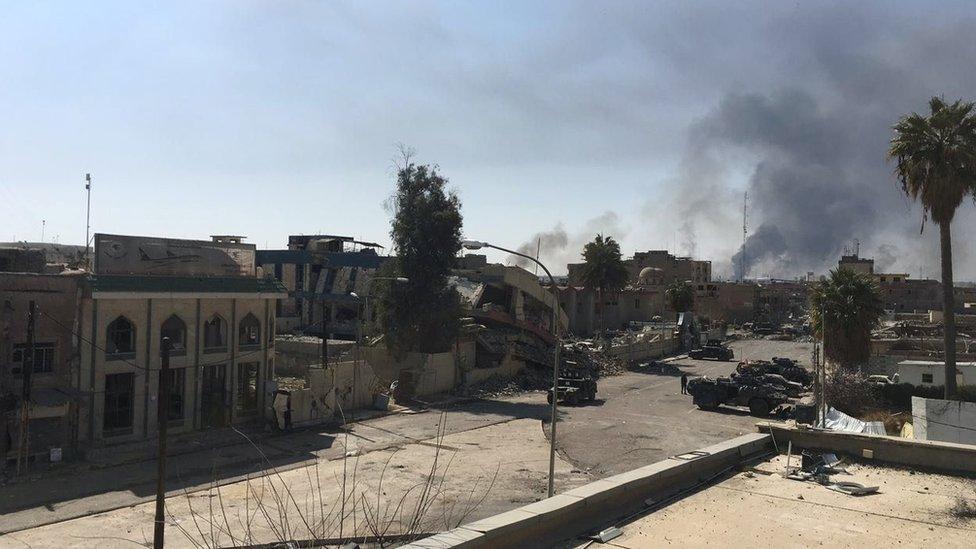
A destroyed government building in west Mosul
Although the structures are reported to be largely destroyed, they are a strategic and symbolic win.
Iraqi Prime Minister Haider al-Abadi arrived in Mosul on Tuesday morning to meet military leaders.
Iraqi forces 'surrounded'
IS is fighting fiercely to retain its territory.
Sgt Azam Ibrahim of the federal police told The Associated Press news agency that his unit were among the first to storm the government office, but were then told to pull back amid fierce clashes.
"We were pulled back because we had killed and wounded,'" said Sgt Ibrahim. "The [Iraqi] forces there are surrounded, the Humvees [military vehicles] cannot reach them, nor can the ambulances."
IS has claimed multiple suicide attacks against Iraqi forces across various neighbourhoods in west Mosul on Monday and Tuesday.
A US general in the international coalition told Reuters news agency that IS's defence was disorganised and its foreign recruits were trying to leave the city.
However, Brig Gen Matthew Isler added that government forces still face a "very hard fight" in trying to push them out of the city.
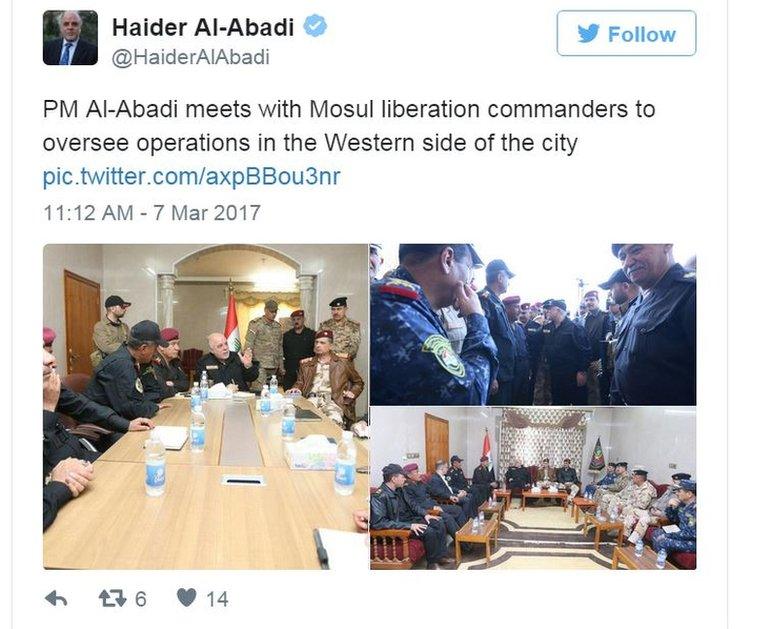
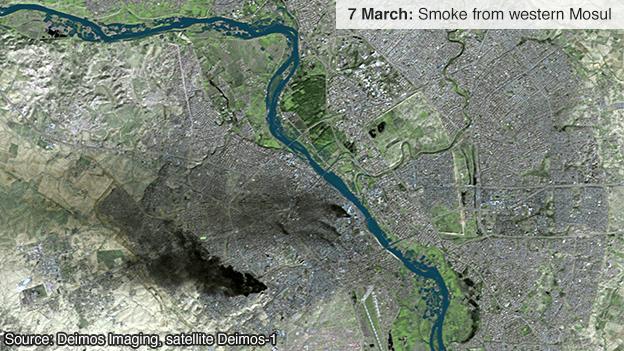
Some colours of the satellite image have been changed to make the image easier to understand
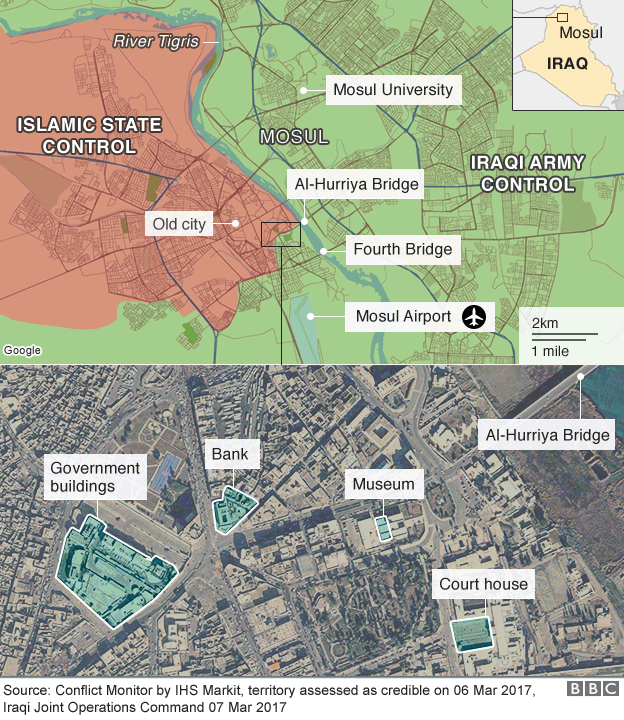
On Tuesday morning, Iraqi forces also captured west Mosul museum, the central bank's main branch, which was looted by IS when they took over the city in 2014, and the nearby courthouse.
The court was used by IS to deliver harsh sentences, including stonings, throwing people off rooftops and chopping off hands, according to Reuters news agency.
The city's museum has also been ransacked. Footage of IS fighters attacking ancient statutes with sledgehammers and drills emerged in February 2015.
One of the militants in the video described the artefacts as "false idols" and attempted to justify their destruction in religious terms.
(March 2015) Professor Eleanor Robson, from University College London, says she has no doubt that a video showing IS militants destroying statues in Mosul is genuine
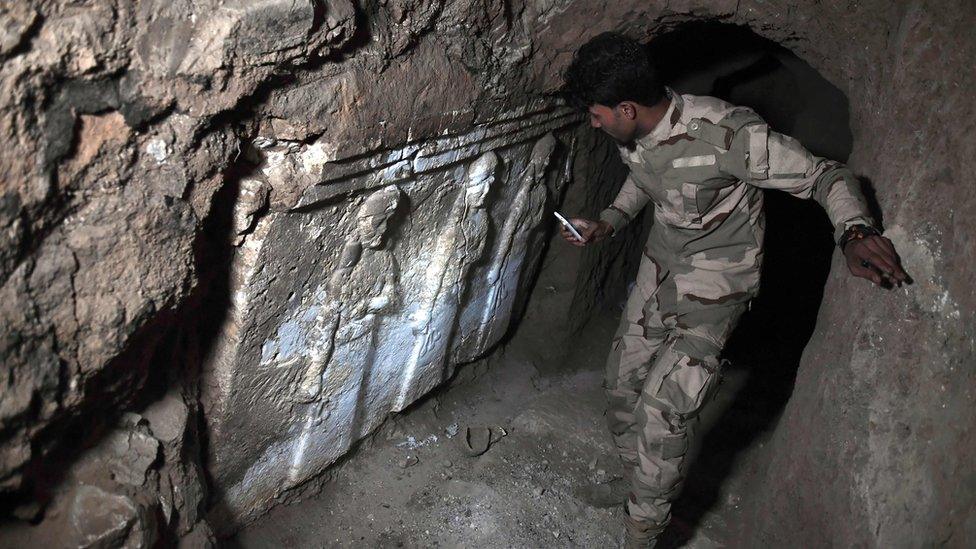
Iraqi forces have come across archaeological findings in underground tunnels created by the jihadists in east Mosul
On Sunday, Iraqi forces began a new push into the western part of Mosul after bad weather slowed them down.
The following day, they captured the al-Hurriya (Freedom) Bridge over the River Tigris.
They had already taken another bridge further south.
US-led airstrikes disabled all five of the city's bridges last year.
Civilians cross the battlefield to flee west Mosul
The UN estimates that there are up to 800,000 people still living in west Mosul.
The organisation's Office for the Coordination of Humanitarian Affairs says approximately 42,000 people were displaced last week alone.
"Given the narrow streets and high population density in western Mosul city, civilians are at great risk of being caught in crossfire, and infrastructure is likely to sustain damage. Clean drinking water is also in very short supply," it said in a report released on Sunday.